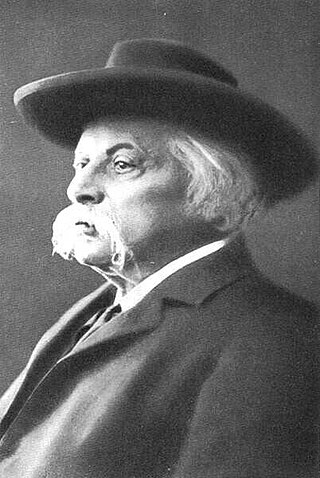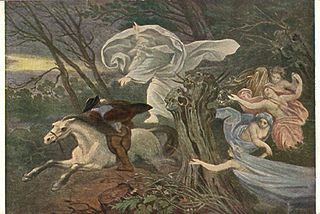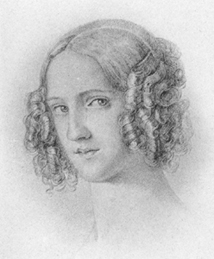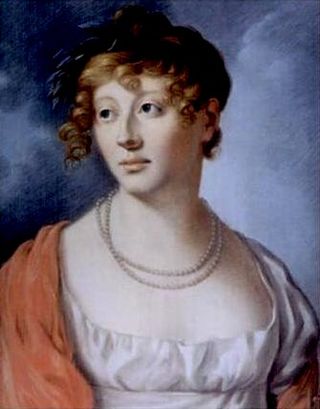In music, the opus number is the "work number" that is assigned to a musical composition, or to a set of compositions, to indicate the chronological order of the composer's publication of that work. Opus numbers are used to distinguish among compositions with similar titles; the word is abbreviated as "Op." for a single work, or "Opp." when referring to more than one work. Opus numbers do not necessarily indicate chronological order of composition. For example, posthumous publications of a composer's juvenilia are often numbered after other works, even though they may be some of the composer's first completed works.

Johann Carl Gottfried Loewe, usually called Carl Loewe, was a German composer, tenor singer and conductor. In his lifetime, his songs ("Balladen") were well enough known for some to call him the "Schubert of North Germany", and Hugo Wolf came to admire his work. He is less known today, but his ballads and songs, which number over 400, are occasionally performed.

Heinrich Schütz was a German early Baroque composer and organist, generally regarded as the most important German composer before Johann Sebastian Bach and one of the most important composers of the 17th century. He is credited with bringing the Italian style to Germany and continuing its evolution from the Renaissance into the early Baroque. Most of his surviving music was written for the Lutheran church, primarily for the Electoral Chapel in Dresden. He wrote what is traditionally considered the first German opera, Dafne, performed at Torgau in 1627, the music of which has since been lost, along with nearly all of his ceremonial and theatrical scores. Schütz was a prolific composer, with more than 500 surviving works.

Karl Goldmark was a Hungarian-born Viennese composer.

"Erlkönig" is a poem by Johann Wolfgang von Goethe. It depicts the death of a child assailed by a supernatural being, the Erlking, a king of the fairies. It was originally written by Goethe as part of a 1782 Singspiel, Die Fischerin.

Carl Friedrich Zelter was a German composer, conductor and teacher of music. Working in his father's bricklaying business, Zelter attained mastership in that profession, and was a musical autodidact.
A Faust Symphony in three character pictures, S.108, or simply the "Faust Symphony", is a choral symphony written by Hungarian composer Franz Liszt inspired by Johann Wolfgang von Goethe's drama, Faust. The symphony was premiered in Weimar on 5 September 1857, for the inauguration of the Goethe–Schiller Monument there.

Max Friedlaender was a German bass singer, music editor, and musicologist. He specialized in German Lieder.

Franz Krommer was a Czech composer of classical music and violinist. He was one of the most popular composers in the 19th century Vienna alongside Beethoven whom he knew. Today he is mostly known for his clarinet and double clarinet concertos.

The Piano Concerto in C major, Op. 39 (BV 247), by Ferruccio Busoni, is one of the largest works ever written in this genre. Completed and premiered in 1904, it is about 70 minutes long and laid out in five movements played without a break; in the final movement a quiet men's chorus intones words from the verse-drama Aladdin by Adam Oehlenschläger.

Josephine Caroline Lang was a German composer. Josephine Lang was the daughter of Theobald Lang, a violinist, and Regina Hitzelberger, opera singer. Her mother taught young Josephine how to play piano, and from age five it became apparent that Josephine was possessed with great potential as a composer. As early as age eleven Josephine started giving piano lessons herself. Through her godfather, Joseph Stieler, Josephine was exposed to some of the greatest artists of her time. Both Felix Mendelssohn and Ferdinand Hiller went to great lengths to ensure that Lang learned the proper theory for song-writing, and used their connections to publish Lang's music. Even Robert Schumann published a song of Josephine's in Neue Zeitschrift für Musik in 1838.

Die erste Walpurgisnacht is a poem by Johann Wolfgang von Goethe telling of efforts by Druids in the Harz Mountains to practice their pagan rituals in the face of new and dominating Christian forces.
Felix Mendelssohn's Piano Quartet No. 2 in F minor, Op. 2, for piano, violin, viola and cello was published in 1823, a year after his first Piano Quartet No. 1 in C minor, Op. 1. This work was dedicated to Carl Friedrich Zelter, who became Mendelssohn's composition and music tutor starting at the age of eight years old. Zelter would take Mendelssohn on trips to go see Johann Wolfgang von Goethe, who was also an important figure in Mendelssohn's life when it came to the composition of his earliest pieces between the years 1821-1825. Mendelssohn's three piano quartets were the first piano quartets he composed and published. He composed the second quartet at the age of only 14 years.

Baroness Karoline Jagemann von Heygendorff was a major German tragedienne and singer. Her great roles included Elizabeth in Mary Stuart (1800) and Beatrice in The Bride of Messina (1803). She is also notable as a mistress of Karl August, Grand Duke of Saxe-Weimar-Eisenach, the father of her three children. Both she and Karl August had their portraits painted by Heinrich Christoph Kolbe.

Walther Wolfgang Freiherr von Goethe was a German composer and court chamberlain. He was one of the grandsons and last living descendant of Johann Wolfgang von Goethe.
The Thüringer Symphoniker Saalfeld-Rudolstadt is a symphony orchestra based at Rudolstadt in Thuringia.

"Gesang der Geister über den Wassern" is a 1779 poem by Johann Wolfgang von Goethe (1749–1832). It may be best known in the English-speaking world through a musical setting of 1820–21 by Franz Schubert (1797–1828) as a part song for men's voices and low strings (D.714).

Carl Josef Thiel was a German organist, church musician and professor of music.

"Erlkönig", Op. 1, D 328, is a Lied composed by Franz Schubert in 1815, which sets Johann Wolfgang von Goethe's poem of the same name. The singer takes the role of four characters — the narrator, a father, his small son, and the titular "Erlking", a supernatural creature who pursues the boy — each of whom exhibit different tessitura, harmonic and rhythmic characteristics. A technically challenging piece for both performers and accompanists, "Erlkönig" has been popular and acclaimed since its premiere in 1821, and has been described as one of the "commanding compositions of the century".

Traugott Maximilian Eberwein, was a German composer and conductor, who is attributed with the start of early musical history in Rudolstadt.
















